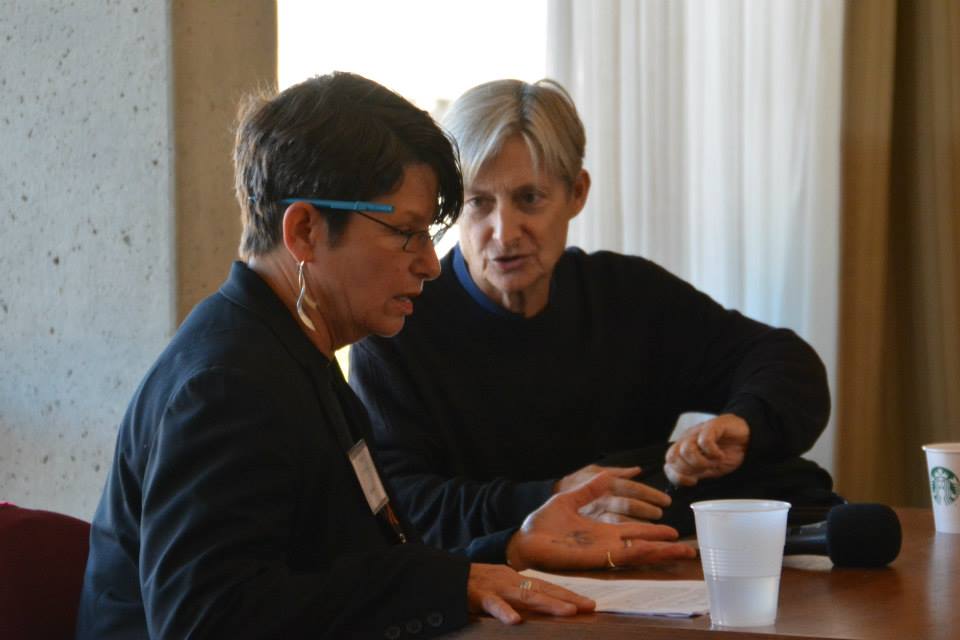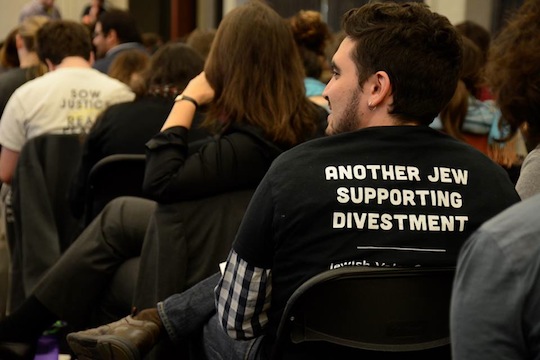By demanding their voices be heard, Open Hillel students are making dissent within the Jewish community impossible to deny.
By Sarah Anne Minkin
Hillel is the Jewish home for college students. With more than 550 Hillels worldwide, mainly in North America, it is one of the primary sites where young Jews express, explore, and cultivate their Jewishness. So a few years ago when Hillel International, the parent organization, imposed strict guidelines around engagement with Israel, many students were upset to find themselves facing formal prohibitions.
After years of struggles within Hillels over who was in the “big tent” of Jewish community, the guidelines were supposed to clarify the boundaries of what was acceptable within the Jewish community. They prohibit hosting or cosponsoring an event with any organization or person who support BDS or commit Natan Sharansky’s “3 D’s” – demonizing, delegitimizing, or applying a double standard to the state of Israel.
The guidelines epitomize the marginalization and exclusion of dissent from within the confines of formal Jewish community on college campuses. Just look at the attempt to establish a JVP chapter at Brandeis, for instance, or the Breaking the Silence controversies at Penn and other places, or the brouhaha over Jews and Palestinians wanting to co-host former Knesset Chairman Avraham Burg at Harvard.
Frustrated students responded by getting organized. In 2013, under the “Open Hillel” banner, students launched a campaign and petition calling on Hillel to cancel its guidelines. Starting at Harvard, the effort caught on; Swarthmore Hillel declared themselves Open in December 2013, followed by Vassar in February 2014 (timeline here).
Open Hillel held its inaugural conference on October 11-13, gathering more than 350 people, mostly students and young alumni, representing a range of backgrounds, interests, and connections to Israel/Palestine. Some arrived as committed BDS-ers planning campaigns on their campuses. Some oppose BDS and align with J Street. Others arrived without a firm position.
The point of Open Hillel is to flex the muscles of inquiry and analysis rather than constrict debate. This aim will lead some to political action and others to inquire more. But in an age in which conversation is preemptively sterilized – speakers barred, ideas silenced – just convening an open conversation is a political act.
Five takeaways from the conference:
1. Students reject the idea that the Israel they are supposed to “love” is somehow separate from the system of ethnic privilege that they reject. That is, the mainstream approach of featuring Israel “beyond the conflict” does not work with this crowd. They want to unpack the ways in which occupation, discrimination against non-Jewish citizens, and the Nakba are central features of this Israel that they are instructed to support. In pursuing the debate, Open Hillel airs big questions with no clear answers.
2. Israel/Palestine is not just a Jewish issue. Organizers invited Palestinians to lead workshops and asked Palestinian historian Rashid Khalidi to give a keynote. Where most Jewish organizations might hold “dialogue” sessions with Palestinians behind closed doors, Open Hillel made it clear that hearing from and engaging with Palestinians is an imperative.

3. Intersectionality is a fact. One student shared that her Hillel director said their campus couldn’t deal with Israel in a more complex way because “then we’d have to deal with race and gender, too.” The Open Hillel conference made clear that race, gender, sexuality, and intermarriage are critical issues in the Jewish community overall and in relation to Israel/Palestine.
That the personal is political is a given. Open Hillel made space for articulating, investigating, and surfacing some of the contradictions, challenges, and implacable struggles of being a Jew in America. These struggles are intertwined with, but not limited to, the debate over Israel/Palestine.
4. Fear matters – but it is does not get the final word. The pain of isolation from Jewish family, friends, and institutions; the threat of being sidelined or cast out of Jewish spaces; the heartbreak at hearing yourself called a self-hating Jew or being told you’re not a Jew at all – these are common experiences among Jews who criticize Israel’s treatment of Palestinians. For many, especially those who work in academia or for Jewish organizations, speaking out can lead to the loss of a job, a grant, a promotion. At the same time, anti-semitism is a real and frightening phenomenon that no one wants to abet.
Yet conference organizers committed to holding an open conference, inviting participants and speakers from opposition organizations (including the Zionist Organization of America), welcoming the press and encouraging tweeting. It is a tactic of the right to try to undermine critics of Israel by spying and reporting, threatening exposure to ensure silent compliance. People who have used these measures were at the conference. But instead of closing the conference off and trying to make it safe behind closed doors, organizers welcomed transparency. This powerful decision declares the legitimacy of dissent.
5. Two parallel and enmeshed struggles are at work here: Ensuring justice in Israel/Palestine and expanding and changing the discourse in the U.S. These are both big battles. The Jewish struggle to open up Jewish spaces to candid, wide-ranging, no-holds-barred conversations about the state of Israel is a key factor in both.
Open Hillel students are forming alternative communities, as every dissenting movement does. But in their demand to be allowed a place at the Jewish communal table, they make dissent within the Jewish community visible and impossible to deny.
Only time will tell how this effort will unfold as these students graduate and move on from their college years. But if this inaugural conference offers any guidance, Open Hillel is creating a community for whom serious debate, challenging conventional wisdom, struggling for justice, and wrestling with Israel are the Jewish values to which these committed Jews subscribe.
*For more on the Open Hillel conference, see these articles by Dina Kraft, Batya Ungar-Sasson, Peter Beinart, and conference organizers Naomi Dann and Evan Goldstein.)
Sarah Anne Minkin is a post-doctoral fellow at University of California-Berkeley’s Center for Right-Wing Studies.
Related:
‘Open Hillel’ seeks to redefine U.S. Jewish debate on Israel-Palestine
Israelis in the U.S. urge the Jewish community to take a closer look at Gaza


